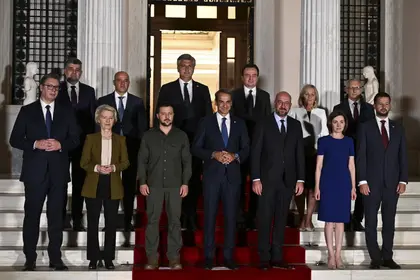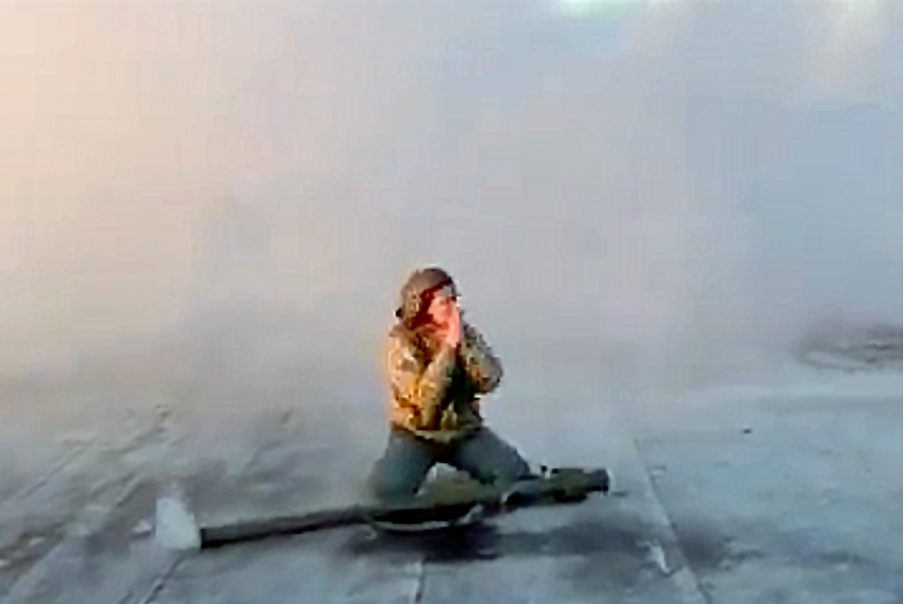On Aug. 21, President Volodymyr Zelensky arrived in Greece to attend the Ukraine-Balkan summit. There, the leaders of 11 southeastern countries signed the Athens Declaration, reaffirming their support for Ukraine and emphasizing their EU commitment. In doing so they demonstrated real European values, leaving others in the EU, including Russia’s proxies, to take note.
Greek Prime Minister Kyriakos Mitsotakis published the eight-point declaration in which leaders reiterated their support for Ukraine in the face of Russian aggression, emphasizing Europe's commitment to shared principles, unity, and the rule of law.
The attendees commended President Zelensky's principles for peace in line with the UN Charter and insisted on accountability for Russia’s war crimes. They also acknowledged the European aspirations of the Western Balkans, Ukraine and Moldova, highlighting their shared heritage, history, and challenges.
The leaders expressed the importance of a genuine enlargement process for these nations, provided that they fulfill the necessary conditions, and envisioned an EU that embraces them as full members. They stressed the need for a clear, ambitious goal that reflects the current geopolitical landscape.
Some were surprised to see Serbia’s President Aleksandar Vucic, a traditional Russian ally, signing the document and meeting with Zelensky. This does not come as a surprise to Belgrade-watchers as the Serbian president is known for his balancing act between Moscow and Washington.

Russia’s War in Ukraine Has Consequences ‘Not Just for Ukraine, But for the Global Community’ – COP29
Vucic’s meeting with Zelensky caused something of a stir. European Parliament member Viola von Cramon posted on X (formerly Twitter) that it’s very likely that Vucic met with Zelensky “to put pressure on Ukraine with weapons for non-recognition of Kosovo,” warning Zelensky around the “political risk” that such a deal might entail.
Whilst the declaration caused controversy among far-right groups in Serbia, Vucic immediately justified his signature on the document and prided himself for negotiating the text and removing “two important points” that were unacceptable for Serbia. He also justified the removal of sanctions provisions against Russia within the text of the declaration as not being in Serbia’s interest. Serbia’s veto on this point should not come as a surprise given its allegiance to the Kremlin and its own policy position against sanctions on Russia.
The declaration emphasizes that the Western Balkans, Ukraine and the Republic of Moldova, should be “embraced as full-fledged members of the European family.”
Maia Sandu, the unapologetically pro-EU and pro-NATO President of Moldova, stated: “Moldova’s accession to the EU is an investment in our democracy and regional security. The authorities in Chisinau are firmly committed to carrying out the reforms that will allow us to create European living conditions at home.”
Moldova, a strong backer of Ukrainian sovereignty, has recently taken a number of steps to crack-down on Russian influence at home, including expelling 45 Russian diplomats of the 70 that were stationed in Chisinau.
Ukraine’s winning formula
Zelensky was a clear winner at the Summit, as the dozen leaders strongly backed Ukraine's claims that Russia had illegally invaded his nation and called for the full restoration of its territorial integrity. In the Summit's declaration, the gathered leaders “expressed support and appreciation for the earnest efforts by Zelensky” in setting out the principles for peace in line with the UN Charter, in his Peace Formula. The declaration also “welcomed the efforts of the UN General Assembly to promote a comprehensive, just, and lasting peace in Ukraine.”
Despite the warm feelings, it would be naïve to expect Serbia to join the EU in the foreseeable future given the state of its democracy, which the Freedom House has characterized as a form of “transitional or hybrid regime” whose ruling Serbian Progressive Party (SNS) has “steadily eroded political rights and civil liberties.”
The declaration, emphasizing EU membership, is great news and the EU should welcome and encourage such commitment. However, it is critical that actions reflect statements. While the EU should continue to invest economically and politically in those countries, it should be cautious of not enabling Serbia and its proxies in the Western Balkans, such as Milorad Dodik in Bosnia and Herzegovina, to slow down the EU membership path for candidate states.
Given Vucic’s fear of democratization in Serbia, as well as its adjacent states, he will continue to tarnish the image of the rest of the Western Balkans to torpedo their EU membership ambitions. Moldova and Ukraine have been clear in demonstrating their commitment to fulfilling their obligations to join the EU, and the EU should avoid postponing their membership whilst waiting for countries in the Western Balkans to collectively join the union.
For Ukraine, the summit in Athens was undoubtedly a positive – bringing together many regional leaders who spoke out strongly on the need to further support Ukraine. In the week of Ukrainian Independence Day, several European presidents also visited Kyiv to endorse its EU membership. Feeling in Europe also appears to grow ever warmer to the idea of Ukraine’s future membership of NATO.
The views expressed are of the authors and not necessarily of Kyiv Post.
You can also highlight the text and press Ctrl + Enter






